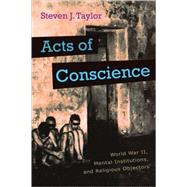Acts of Conscience: World War II, Mental Institutions, and Religious Objectors
, by Taylor, Steven J.- ISBN: 9780815609155 | 0815609159
- Cover: Hardcover
- Copyright: 4/1/2009
In the mid- to late 1940s, a group of young men rattled the psychiatric establishment by beaming a public spotlight on the squalid conditions and brutality in our nation┐s mental hospitals and training schools for people with psychiatric and intellectual disabilities. Bringing the abuses to the attention of newspapers and magazines across the country, they led a reform effort to change public attitudes and to improve the training and status of institutional staff. Prominent Americans, including Eleanor Roosevelt, ACLU founder Roger Baldwin, author Pearl S. Buck, actress Helen Hayes, and African-American activist Mary McLeod Bethune, supported the efforts of the young men. These young men were among the 12,000 World War II conscientious objectors who chose to perform civilian public service as an alternative to fighting in what is widely regarded as America┐s "good war." Three thousand of these men volunteered to work at state institutions, where they found conditions appalling. Acting on conscience a second time, they challenged America┐s treatment of its citizens with severe disabilities. Acts of Conscience brings to light the extraordinary efforts of these courageous men, drawing upon extensive archival research, interviews, and personal correspondence. The World War II conscientious objectors were not the first to expose public institutions, and they would not be the last. What distinguishes them from reformers of other eras is that their activities have faded from professional and popular memory. Steven J. Taylor┐s moving account is an indispensable contribution to the historical record.







